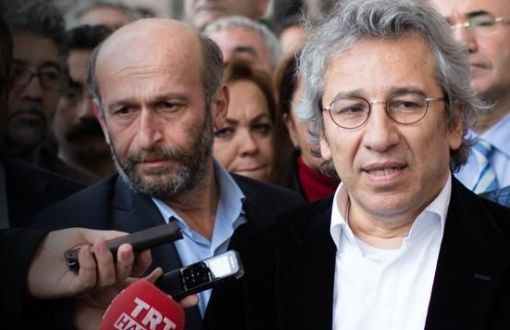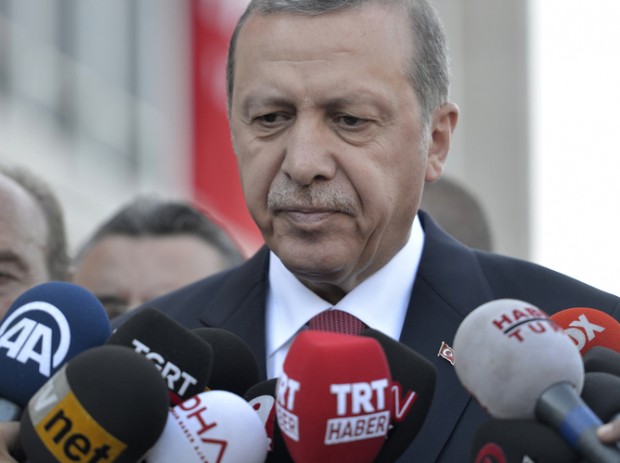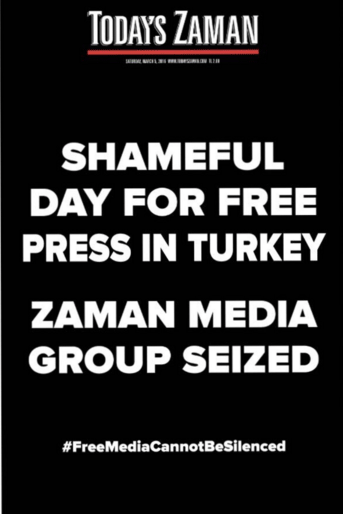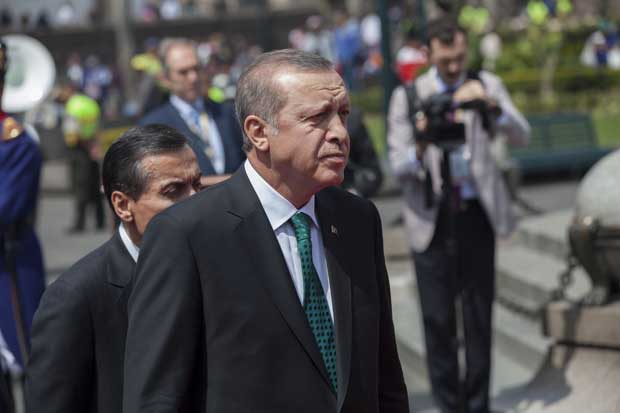8 Jun 2016 | News, Turkey, Turkey Uncensored
Nothing could illustrate the course of developments in Turkey better than the case of prosecutor Murat Aydın.
In what was described as a “judicial coup” in critical media, Aydin was one of 3,746 judges and prosecutors, who were reassigned in recent days, an unprecedented move that has shaken the basis of the justice system. Some were demoted by being sent into internal “exile”, some were promoted.
According to daily Cumhuriyet, his pro-freedom stance landed him in the former group.
Aydin’s transgression was to challenge the Turkish Penal Code’s Article 299 — the basis of “insulting the president” cases — in the country’s constitutional court. He argued that Article 299 was unconstitutional and conflicted with the European Convention on Human Rights. He had asked the top court to void the article.
After the reshuffle, he was told he would now be handling cases in Trabzon on the Black Sea coast, clear across the country from İzmir on the Aegean, where he had been working.
“I was exiled because of the decisions I have made and my expressed views,” he told Cumhuriyet. ”The worst part is, there is no authority any longer where we seek these type of sanctions to be checked, where we can challenge unjust acts.”
Meanwhile, another prosecutor, Cevat İslek, who made his name filing charges against journalists on the basis of “insulting the president” was promoted, Cumhuriyet noted, to the position as the deputy chief prosecutor in Ankara.
One wonders how such transfers are perceived by the public. Do Turks notice that the how the president, Recep Tayyip Erdoğan, and his AKP government are seizing control over the domain of expression through the imposition of large-scale punitive measures? Do they notice that this is taking place in defiance of the constitution, which defines the office of the president as being “impartial”?
The accelerated authoritarianism in Turkey — chiefly targeting media, academia and civil dissent — leaves nothing to chance. Though the media sector and its professionals remain top of the list for the president’s persecution, those who are seen as instrumental in filing and judging the court cases against them are also targets.
The issue has raised the alarm levels to new heights. In a recent report a global body of legal experts issued an “orange level” of concern on the state of the judiciary in Turkey, warning, after scrutinising the rising problems, that it is falling into total subordination of the executive.
”The ICJ remains concerned that transfers are being applied as a hidden form of disciplinary sanction and as a means to marginalize judges and prosecutors seen as unsupportive of government interests or objectives,” the Geneva-based International Commission of Jurists (ICJ) wrote in its report, Turkey: the Judicial System in Peril, which was prepared after a long series of talks with anonymous judges and prosecutors, among others.
“Many of those with whom the mission met noted that there are now unprecedented levels of pressure, division, distrust and fear in the Turkish judiciary. There are alarming signs that this has already led to manipulation of the judicial system on political grounds, including to target government opponents or to criminalize and prosecute criticism of the government. Of particular concern, is the high number of prosecutions for offences restricting freedom of expression, in particular for the offence of ‘insulting the president’.”
With the backbone of justice highly infected by partisanship, a “total eclipse” is looming and it becomes much easier to grasp the magnitude of oppression. “Insulting” cases may have risen above 2,000 since last year, but what is happening today is a multifaceted assault on freedom of speech and journalism as a whole.
Media monitoring organisations – Platform for Independent Journalism, Reporters Without Borders and Turkish Trade Union of Journalists – estimate that, now, the portion of media under direct and/or indirect control of the presidential palace and the AKP, is around 90%. This is corroborated by Mapping Media Freedom, which has recorded the litany of cuts against journalism.
The remnant segment of independent journalism operates, under great legal and financial strain, with dailies such as secular Cumhuriyet, liberal Özgür Düşünce, leftist Birgün and Evrensel, and Kurdish Özgür Gündem. On the TV side, the “capture” is even more severe: there are only three channels — Kurdish IMC TV, liberal CanErzincan and secular Halk TV — airing critical content.
But even such a weakened media segment seems to worry the authorities. The most recent meeting of the National Security Council, a powerful body symbolising state authority, ended with the endorsement that the battle against what the AKP sees as the “domestic enemies”, namely the Kurdish Political Movement and what Erdoğan depicts as “parallel structure” Gülenists, will be escalated.
Everybody knows what this refreshed announcement means: the remaining independent outlets will be criminalised by any means necessary. The latest developments indicate that the special office of prosecution on crimes against the constitution is preparing to launch inquiries against a number of outlets, chiefly targeting the Kurdish media. In other words, further closures may be expected to appear on the government’s agenda.
Along with the systematic arrests of more than 12 reporters of Dicle News Agency, which is almost the only source of news on what takes place during “scorched earth” operations in the mainly Kurdish southeastern provinces, the strongest sign on the media clampdown is the legal investigation filed against more than 15 well-known journalists — most of them non-Kurdish — who took part in an act of solidarity, “Chief Editors Vigil”, with the pro-Kurdish daily, Özgür Gündem.
The journalists are expected to be charged with “terrorist propaganda” under Turkey’s anti-terror law, which Erdoğan and the AKP government refuses to revise despite EU demands – a key criteria for visa liberalisation for Turkish citizens.
Nothing, it seems, will suffice to alter the authoritarian course Turkey has been taking and the price journalists and peaceful dissidents are forced to pay rises geometrically.
But nothing seems to stop the tiny-but-tough core of resistant journalists who continue to confront the Orwellian state as it consolidates itself under the nose of the pro-government and subservient media.

Turkey Uncensored is an Index on Censorship project to publish a series of articles from censored Turkish writers, artists and translators.
11 May 2016 | About Index, Campaigns, Campaigns -- Featured, Europe and Central Asia, Statements, Turkey, Turkey Statements

Journalists Erdem Gül and Can Dündar in November 2015 (Photo: Bianet)
The sentencing of journalists Can Dündar and Erdem Gül to years in prison for sharing state secrets underscores how Turkey’s government is crushing critical voices. The trial follows Dündar and Gül’s investigative reporting on links between the Turkish intelligence services and arms to Islamist groups in Syria. Dundar has been sentenced to five years and 10 months, and Gul to five years.
Index on Censorship condemns this clearly political ruling and calls for an end to judicial harassment of Dündar, Gül and all journalists in the country. The country’s drastic decline has been well documented by Index’s Mapping Media Freedom project and Reporters Without Borders’ World Press Freedom Index. The closure of the seized Zaman newspaper group is only one recent example of the government’s draconian attitude toward independent media.
“The Turkish government is now resorting to locking up journalists like Dündar and Gül, who sought to reveal information of public interest, something journalists around the world do every day. Yet they are paying a heavy price. The sentencing is an example of an ongoing decline in Turkey’s attitude to freedom. It has entered a new dark age where the truth is forbidden and even a hint of dissent is not tolerated,” Melody Patry, senior advocacy officer, Index on Censorship, said.
From the outset of the case in November 2015, Dündar, the editor-in-chief of daily newspaper Cumhuriyet, and Gül, head of the paper’s Ankara bureau, were accused of spying and terrorism after the paper published evidence in May 2015 of Turkey’s intelligence services’ involvement in Syria’s civil war. In the wake of the revelations, Recep Tayyip Erdogan, president of Turkey, publicly declared that Dundar and his paper “will pay for this”.
Dündar nearly paid with his life. Shortly before a court issued his sentence, a man identified in Daily Sabah as Murat Şahin attempted to shoot the editor, but was thwarted by the intervention of Dundar’s wife and an onlooker.
Both Dündar and Gül are free on bail as they appeal their sentences.
3 May 2016 | Mapping Media Freedom, mobile, News, Turkey, Turkey Uncensored

February 4, 2013. Recep Tayyip Erdogan during a press conference in Prague.
With conditions worsening on a daily basis, Turkey now risks total blackout on public debate.
Punitive measures and harsh restrictions have diminished the domain for free and independent journalism, and media pluralism is showing strong signs of total collapse.
As Index on Censorship’s Mapping Media Freedom project highlights in its latest quarterly report, the country experienced a large number of media freedom violations.
“Over half of the arrests [in the first quarter of 2016] occurred in Turkey when journalists were reporting on violence or protests in the country,” the report said. “The data indicates a pattern where arrests are launched on terror charges or taking place during anti-terror operations.”
In its latest World Press Freedom Index, scrutinising media in 180 countries, Reporters Without Borders (RSF) ranked Turkey as #151, marking yet another fall, this time by two positions.
“President Recep Tayyip Erdogan has embarked on an offensive against Turkey’s media. Journalists are harassed, many have been accused of ‘insulting the president’ and the internet is systematically censored,” RSF said in its findings.
The decline was even more dramatic in the annual Freedom of the Press 2016 survey by Freedom House. Its survey over the past year marked a fall by six points, placing Turkey as 156th among 199 countries, again among those as “not free”.
“The government, controlled by Erdoğan’s Justice and Development Party (AKP), aggressively used the penal code, criminal defamation legislation, and the country’s antiterrorism law to punish critical reporting, and journalists faced growing violence, harassment, and intimidation from both state and non-state actors during the year. The authorities continued to use financial and administrative leverage over media owners to influence coverage and silence dissent,” it concluded.
This downfall is unprecedented in intensity. The country’s remnant core of brave, free and independent journalists, regardless of their political views, now agree that free journalism will soon cease to exist in Turkey. With full-frontal attacks on the media, the sector may become subservient to the political and bureaucratic power, with content rife with stenography and propaganda.
Legal inquiries and charges against journalists are continually on the rise. According to the ministry of justice, the number of “insulting the president” cases passed 1,800 since mid-2014.
In other cases, such as the charges brought against Cumhuriyet daily, its editors Can Dündar and Erdem Gül are accused of spying and treason, for printing news stories about lorries carrying weapons, allegedly to Syrian jihadist groups, by the government’s orders.
In another notorious case, investigative journalist Mehmet Baransu has been detained for over 13 months over his inquiries into the alleged abuses of power within the military.
In a fresh case, two senior journalists from Cumhuriyet, Ceyda Karan and Hikmet Çetinkaya, were sentenced to two years each in prison for “inciting hatred”. Their “crime” was to reprint the Charlie Hebdo front page cartoon in their column, which they said was an act of professional solidarity.
According to Bianet, a monitoring site, there are now 28 journalists in Turkish prisons, many of whom are affiliated with the Kurdish media, based on charges brought under anti-terror laws.
The draconian nature of charges and prison sentences leave little doubt about AKP government’s intent to criminalise journalism as a whole.
Punitive measures against journalism go far beyond court cases. The most efficient method has proven to be firing journalists who insist on exercising basic standards of the profession.
Since mid-2013, following Gezi Park protests, 3,500 journalists have lost their jobs. Media moguls have come under increasing pressure from the government, which demands action or threatens to cancel lucrative public contracts. Taking advantage of the low influence of trade unions (fewer than 4% of journalists are members), employers axe staff arbitrarily.
As a result of this widespread exercise in conglomerate-dominated “mainstream media”, with newsrooms turned into “open-air prisons”, self-censorship in Turkey has become a deeply rooted culture. Blacklists have been drawn up of TV pundits and columnists in the press, who are known for critical stands, no matter their political leaning.
What apparently weighed heavy in the gloomy figures by Index on Censorship, RSF and FH is the fact that, from early last year, authorities started also targeting large, private media institutions, known for critical journalism.
Hürriyet, an influential newspaper belonging to Doğan Media was attacked by a mob two nights in a row last summer, after which its owners felt they had to “tone down” critical content.
In even more dramatic cases, Koza-Ipek Media outlets were raided by the police last autumn, followed some months later by a similar large-scale operation against Zaman Media, second largest group in the sector, and the largest independent news agency, CHA.
These seizures, along with some other critical channels yanked off satellite and digital platforms in recent months, left a huge vacuum, threatening to terminate the diversity of the media.
Now, with around 90% of the sector under direct or indirect editorial control of the AKP government, including the state broadcaster TRT, there are only three critical TV channels and no more than five small-scale independent newspapers left.
As a result of these assaults, two things are apparent: firstly, investigative journalism is blocked and news is severely filtered; secondly, with diversity fading out, public debate, a key aspect of any democracy, is severely limited.
Along with routine bans on reporting on specific events such as terror attacks, severe accreditation restrictions and a newly emerging pattern of deporting international media correspondents, the conclusion is inevitable.
A profession faces extinction and along with its exit, and a thick wall between the truth and the public, both domestic and international, is emerging. This total collapse will have far deeper consequences than anyone can imagine.

Turkey Uncensored is an Index on Censorship project to publish a series of articles from censored Turkish writers, artists and translators.
23 Mar 2016 | Mapping Media Freedom, mobile, Turkey

The increasingly autocratic government of Recep Tayyip Erdogan, president of Turkey, has clamped down on press freedom and opposing political viewpoints. Index on Censorship has condemned the ongoing attack on freedom of expression and, through its project Mapping Media Freedom, monitored the growing threats to the media. Below is a roundup of our recent reporting on media violations in Turkey.
Below is a roundup of our recent reporting on the ongoing media freedom crisis in Turkey.
Writers and artists condemn seizure of Zaman news group
Index joined with writers, journalists and artists around the world to condemn the seizure of Turkish independent media group, Zaman. Read the full letter
Letter: EU must not ignore collapse of media freedom in Turkey
Press freedom and media organisations wrote to Donald Tusk, president of the European Council ahead of the meeting between EU leaders and Ahmet Davutoğlu, prime minister of Turkey, to express their concern over the collapse of media freedom in Turkey. Read the full letter
Petition: End Turkey’s crackdown on press freedom
Join Index on Censorship, writers, journalists and artists from around the world to condemn the shocking seizure of Turkish independent media group, Zaman. Sign the petition
Turkish court orders seizure of Zaman news group
The seizure of Turkey’s biggest opposition newspaper is the latest move against press freedom in the country. Since the election of Turkey’s president Recep Tayyip Erdoğan in 2014, the increasingly autocratic politician has waged an ongoing war with voices critical of his government. Read the full article
Kaya Genç: On “coup plots”, journalism trials and Turkey’s need for a proper dissensus
The modern crisis in Turkey’s journalistic freedoms began in 2008. Index on Censorship magazine’s Kaya Genc revisits the “coup cases” that ended up turning Turkish journalism into a field of feuds and hostilities. Read the full article
Zaman: The murder of a newspaper
On Friday night, security forces stormed Zaman, the widest-circulating Turkish newspaper. Though many Turkish news outlets studiously avoided covering the raids, the screens of international news channels were full of images of Turkish police using tear gas and water cannon against protestors trying to protect their paper. Particularly striking were the injuries to young women wearing Islamic headgear, the very segment of the community, which the ruling Justice and Development Party (AKP) once vowed to defend. Read the full article
Turkey: A long line of press freedom violations
Turkey’s government and courts have demonstrated their unwillingness to adhere to basic values on press freedom and media pluralism. From judicial harassment and seizing media companies to silencing Kurdish and critical media, Turkey’s government has been used by President Recep Tayyip Erdogan to silence critical voices in the country. Read the full article
Turkey: War on journalists rages on
The ongoing deterioration in Turkey’s press freedom has been well documented by Index on Censorship’s Mapping Media Freedom project since its launch in 2014. Read the full article
 Zaman’s censored writers
Zaman’s censored writers
The following columns were submitted to and rejected by the new management of the seized Zaman and Today’s Zaman.
Yavuz Baydar: Bid farewell to journalism, and lose Turkey
Following the presidential attacks on Turkey’s top judicial body, the Constitutional Court, stemming from its pro-freedom ruling over the case of Can Dündar and Erdem Gül of Cumhuriyet, and the unplugging two opposition channels from Türksat satellite, the dramatic seizure of Zaman and this newspaper, Today’s Zaman, both highly influential in their own ways, is one of the final nails in the coffin of journalism in Turkey. Read the full column
Nicole Pope: A lack of free media allows Turkish authorities to control the narrative
How do you write a column for a newspaper that still exists nominally but has been taken over by trustees appointed by an “independent” court? Such are the dilemmas in a country where democratic standards are slipping rapidly. No journalism school or manual of ethical journalism prepares one for such a situation. Read the full column
İhsan Yılmaz: No more genuine elections in Turkey
Just before I wrote my last piece for Today’s Zaman, there were rumors that the Zaman daily, written in Turkish, and Today’s Zaman, would be seized by the government. Read the full column
Suat Kınıklıoğlu: Europa Europa
Turks who are putting up a brave fight confronting the authoritarianism in this country every day are simply aghast at the show put on in Brussels. Turkey’s democrats have been thoroughly exposed to the crude pragmatism of the EU. Read the full column
Yaşar Yakış: Turkey’s bargain with the EU
An important step has been taken in Turkey’s painful negotiations with the EU. Turkey submitted to the Turkey-EU summit, held in Brussels on 7 March, several proposals. Read the full column
Doğu Ergil: Turkey, the humanitarian crisis and erratic responses
The numerical figures of the reality of Syrian refugees in Turkey are as follows: 2.2 million of the 4.3 million displaced Syrians who have been registered as persons of concern by the Office of the United Nations High Commissioner for Refugees (UNHCR) currently reside in Turkey. There is an estimated 400,000 who have settled in various parts of Turkey relying on their own financial resources. The total number of Syrian refugees in Turkey is higher than the entire population of six of the EU’s 28 member states. Read the full column






 Zaman’s censored writers
Zaman’s censored writers